- Home
- Richard Flanagan
The Sound of One Hand Clapping Page 2
The Sound of One Hand Clapping Read online
Page 2
Behind Maria Buloh ran the tracks that led back to the place from where she came, the tracks that were being lost even as she made them in the falling snow, that were disappearing in the whiteness that threatened to enshroud everybody and everything in that grim little village long, long ago.
And it was some time afterwards, after the canteen had closed and the fighting finished and even the card players had given up for the night and were snoring yeasty breaths into the backs of women who wore their beanies to bed, that the gale rose and the wind began to cry such that it chilled even that wild wet earth.
Aja, aja, it seemed to howl. Aja, aja.
And the old, huge trees could be heard to crack and groan, and the new wires that scratched the vast night sky to whistle eerily, and none of the women who lay awake in their sagging beds that night were soothed by such sounds.
Chapter 2
1967
HE WORKED WOOD; that much Sonja Buloh wished to recall.
How often?
Whenever he could, at work and at play.
What sort of wood?
Tas oak, blackwood off-cuts retrieved from work wastebins, Huon pine when it went cheap from the Finns’ sawmill; chipboard when it didn’t. The white wood of old packing cases, the six-layer plywood used for boxing on some construction jobs, craggy with concrete dags. Celery top and King Billy and black-hearted sassy, when wood-yards cleared out odd lengths of local exotic timbers. But he made something of it all and it was something good of which she was part.
What did he make?
Anything and everything: cupboards and tables to sell, chests to keep for linen they never had, a console for the FJ in the manner of those he had seen in an airliner advertisement, handles for the old Frigidaire, chairs, stools, bookshelves for neighbours, and pot stands and toolboxes for themselves.
He would show her the qualities and uses of different woods: how sassy burnished and Huon shavings kept dog fleas away, how Tas oak framed beautifully and bad pine didn’t, how plywood could be steamed and blackwood made you sneeze when it was sanded, how myrtle was for furniture and celery for windowsills.
He worked wood and he tried to make something of it and in his making make something of them. He worked wood and for her he was wood and she loved him for it, o God, how she so loved him for it.
But when that pungent odour of sour sweated bread and all that it grimly foretold came yet again to Sonja Buloh’s nostrils and she looked up, it was unmistakeable. He was yet again drunk. He was not, it has to be said, a big man, but when the rage was upon him, he could appear so huge that he would be fit to burst out of a room and collapse its walls and crush its frame with the size of his anger and crush you like a steamroller would an ant and anyone else in the process. And the rage came upon him when the drink was within him, which was often and which was more and more with the passing of the years.
He stood above Sonja Buloh swaying, his head turned slightly to one side, and she could see the flesh at the back of his neck puckering red. Wild and dishevelled, part of a blue-checked flannelette shirt hanging out, fly at half-mast, trousers marked with florettes of dried urine—a roaring giant, a maelstrom of a man with pieces flying off everywhere but never quite breaking away and she one more piece, one more item of disarray that was half-stuck and half-unstuck, all only held together in motion by some huge unknowable enigma at his centre from where his arm raised in anger above his head which was shouting, ‘You bloody don’t call me drunk,’ the arm flailing, pushing away something that could not be seen or apprehended, ‘Nobody call me drunk, I have a few beers in pub with my mates, a bit of a good time, and I get home and you bloody say I’m a drunk.’
He was not big nor was Sonja Buloh big nor had she his unusual quality of growing to gigantic proportions. Her quality was precisely the opposite. To elude his wrath she had learnt the art of smallness, of rendering one’s being so tiny as to be invisible to all but the closest scrutiny. Her body, at sixteen years, if stretched out and released from its obligation of smallness was in fact tall for her age, perhaps almost a full five foot ten inches, which made her as tall as him, a point of equality neither seemed to want to dwell upon, and which she had developed a slight stoop to deny.
But this was not the only quality Sonja Buloh possessed. Upon smelling the scent of sour sweated bread her soul had the wondrous ability to take leave of her body. In this way Sonja would see his rage only from far away. His voice she would only hear as if from a great distance, as if she were listening to a spirit caught in a sea shell held to her ear on some distant sand dune. This day she transported herself back out fishing with Bojan in a dinghy in the middle of the Derwent River. Against the immense forested blueness of the mountain behind it, the pepper shaker sandstone spire of the old Cromwell Street church in Battery Point sat yellow and solitary. She could see, but only incidentally, only as blurs, the houses of the city beneath it. It could have been the 1840s or the 1940s. It could have even been Eastern Europe. But it was, as she had written across her schoolgirl’s folder, Hobart, Tasmania, Australia, Southern Hemisphere, the World, the Solar System, the Universe. It was 1967.
It was not him. It was not.
But in the far distance she saw her home and her home was breaking into pieces and a giant was exploding out of it and the giant would not stop growing and the sun was eclipsing behind his back and the world was darkness and the giant’s anger had become a frenzy.
‘I bet you been out with the bloody boys, I know, I know, you bloody slut, you little tart, you are just like your whore of a mother carrying on with—’
And at this point his top lip drew up and shivered and his head quivered and his body shook and his rage momentarily faltered, as if a memory long pushed down was suddenly rising up, but he fought it back, with every particle of strength remaining to him, he forced it way, way back down and he momentarily staggered like a charging wild pig catching a bullet and cried out but one word in vehement denial ‘—bullshit.’
Sonja heard his rage from far away. His slap across her face she wished to feel as if from a great distance, like an unexpected cold wave deflected by the dinghy’s railings. But the slap was not a wave. It was a demand, that she leave the dinghy, leave watching the mountain, leave looking at the town that nestled in its thighs. His slap across her face demanded she leave the river and come back, and his voice was suddenly loud and his hand brought fire to her face. She saw him, a monster unrecognisable. She wanted her father. She did not want him. She did not.
She screamed. She screamed to bring her father back from the dinghy. ‘No, it’s not true, you are only angry because you are drunk, you only say…’
But before she could finish the monster again slapped her across her face, this time twice, this time with more force, this time saying, with anger so cold, the words scaring Sonja more than his open palm, saying, ‘I show you who’s bloody drunk.’
As he continued hitting her, Sonja remained impassive and did not cry, although his blows hurt her greatly. She did not cry, though the welts rose on her flesh and the blood dripping from her nose sprayed the walls each time her head spun with another blow or slap. She did not cry, but he was breaking something and she could not put it back together no matter how she tried, and the hurt opened up like an abyss within her heart. Sometimes she even perversely thought that it was this feeling she carried within her that caused him to be so. Every day she prayed that this faultline of emotion would not move and yet every night it invariably did. Huge subterranean, cataclysmic forces beyond her ken which destroyed that home, and both as powerless to stop it as the tree to stop the earth from collapsing beneath its roots.
She pleaded with the earth in Slovenian.
Saying: ‘Ni, Artie, ni, ni, ni, ni…’
But his rage was absolute, impervious even to her shrill cries, impervious even to his memory that he succeeded in drinking away evening after evening, only for it to return the next morning to drive him to drink again that night.
She ought to have wept, she really ought to have, or at least let a single tear flow, but something within her had long before shattered and though his blows brought forth cries in the way a bellows pumped hard emits air in bursts, he could never find reflected in her face the things he felt himself and so he had no choice but to continue searching that mute, inscrutable land of this girl’s body with his punches and slaps for what he carried within himself. It was an unspeakable act of description, those blows, a painfully eloquent attempt to find what they had in common by sculpting with violent intent all that he felt. But there are good ways of describing pain and bad; and his only increased their agony.
The following morning the house seemed light and airy. He sat at the table freshly washed and shaven, looking only a little seedy. Sonja made some coffee to which she then added milk. She broke bread into two bowls and poured the coffee over the bread. Then she sat down and they began to eat. Without looking at her directly, he began to talk.
‘Funny thing,’ he said, stirring his spoon around the coffee-soaked bread. ‘I can’t remember a thing that happen to me after I left the pub last night.’ Sonja said nothing. His eyes remained averted. He lifted a spoon of coffee and bread to his lips and was about to swallow it when he stopped.
And spoke once more.
‘You remember what happen when I get home?’ And then he looked up at Sonja for confirmation of what he knew to be a lie. ‘I must have go straight to bed.’ Sonja raised her face from her bowl of bread and sweet coffee. He pretended not to see what was so apparent, pretended not to notice how badly swollen the face was, how grotesque the one he thought so beautiful now looked, pretended not to see the puffiness and the purple welts and scarlet bruising.
‘Yeh, you went straight to bed,’ she said. There was a long silence. He said nothing, his face betrayed nothing. ‘And you snored something terrible,’ Sonja added.
He laughed at the small joke. He was satisfied. Sonja laughed too, because now he was sober and guilty, things would be good.
Until his next binge.
That was all many years past now, and as much as possible Sonja had spent her life since then attempting to divest herself of all things that were not necessary for day-to-day living: any extra possessions that were not totally needed, any recollections that were surplus to what she needed to work, to exist, to know who she was. But some things remained, some memories. Sonja remembered the place as possessed of a certain violence of emotion. The wind cuffed the house with sudden wild blows, the rain fell upon their tin roof with the intensity of an avalanche, and afterwards the sun shone so bright she screwed her eyes up every time she went outside, where the steam rose from the hot blue-black bitumen yard in splendid vents between her toes.
She would visit that place now, of course she would—that little hut in a backyard of a northern-suburbs home in Hobart, in which they spent that whole lifetime before this lifetime—she would, were it not that it would be disenchanting. She was a stranger to her past. No-one would see in the professional woman that skinny frightened child with eyes always cast sidewards in expectation of the unexpected blow.
And in that shack, there would be no wood to work, nor sour sweated bread to smell and thus no magic to conjure her soul away from her troubles. These—her troubles—she had in any case long ago learnt to live with, to accept as part of herself.
Therefore: no giants, no magic, no happy endings.
Chapter 3
1989
SONJA BULOH TRIED to remember the first thing that had formed in her belly but she was cold and her hands burnt and her nipples ached so and the chill tore through her flesh into her bones.
Something had seized her like a cramp, had gathered her guts together and cast them downwards that fateful morning in Sydney only a week before, something she at first only understood as a longing, curious and big and strange as the sky above. A wanting to once more see the peculiar Tasmanian light and what it touched upon, what it was that stood between the sun and the earth, that strange light of negative images, whereby the sky could be dark as pitch and the earth could glow ruby gold, and only shadows holding the two together.
She commented upon the cold to the service-station man who had appeared to fill her car with petrol. He was tall and skinny with short black hair and a moustache that belied his middle age, the years and then decades he had watched dissolve and run off the garage tarmac with the dirty oil and and pure rainwater.
‘Mainlander, eh?’ he asked. This was a big question which was not so easily answered, even by answering simply she belonged nowhere.
‘No,’ Sonja said, though it wasn’t quite true, but what was quite true wasn’t that easy to know, let alone say.
Sonja handed him some money and followed him back into his small office to collect her change. Sonja looked at herself in a mirror behind the counter, realised she was staring, not listening. The mirror was old and chipped and contained a large picture of a spark plug in a corner and the logo ‘Moving into tomorrow to keep you moving today!’ She saw in the mirror a woman approaching middle age, in her late thirties, elegant in what was almost office attire, as if off to some formal engagement with a stranger, which was, she supposed, effectively what she was about to do. At whose heart was a mystery few even apprehended and none could divine. And having not been divined, the mystery had grown into a swan of sadness, and in the mirror she saw reflected the wings of that swan growing out from her padded shoulders like those of an angel. Sonja saw her face, still smooth, still olive, if somewhat lined. Her bobbed hair, tipped blonde, but beneath still not grey. A body still not dried up, in the way she could see many of the women of her age were drying up. Still ripe, and she was shocked and amused at such a notion. Ripeness was not something she associated with herself. But she could not deny what she felt: ripe. Nor her pleasure, her folly and her pride, in feeling so. Even the wings in the mirror quivered slightly.
‘We have a lot of mainlanders stop here,’ the service-station man said, handing her the change. ‘They like our heritage and things.’ Sonja looked out beyond the office at the concrete-block toilet, a puddle of urine spreading out from it and at the puddle’s edge where the urine had mixed with old sump oil she saw swimming all the colours of the rainbow, and beyond the extraordinary swirls of metallic wonder a beaten-up country town. She glanced back up at the mirror and saw reflected not herself, nor an angel, but a small frightened child holding a teapot. She involuntarily trembled. But when she looked back the child was gone and only her own image remained.
‘Cold, missus,’ said the man. ‘Lot of mainlanders find it cold down here in Tassie.’
She would find him even after all these years, finally track him down and and ask him what was it that had happened to them? What was it? she would ask. Was it only life? Him? Her? Or was it the woman dressed in lace who tormented Sonja in her dreams?
She would find him, she thought. She would.
The man gave the old wooden cash drawer a forceful shove and as it slammed shut a bell rang within, its brief toll jolting Sonja. Her head swung to look at him. He flashed a smile of reassurance.
‘Even colder out west.’
Chapter 4
1989
THROUGH THE BLOODY dark of the eclipsed morning Sonja Buloh drove along the road to the west, a writhing tapeworm of crumbling bitumen, empty save for Sonja’s red hire car. In that year of revolutions, she was driving through a time grown momentarily molten. In a growing gyre, she felt time circling her, at first slowly, as if waiting. And though it seemed dreams were being born within dreams, it was not so. It was only Tasmania in spring.
When at length light returned—strangely, as if curious—it was to a land at once alien and familiar. Bearing the bruised country into hamlets’ hearts, slow rivers carried broken willow and bastard gorse—those new Australians of the bush—into old convict towns now unravelling like used newspapers in the wind. Sonja Buloh drove through them and into the sheep country, in which occasional ancient
gum trees stood as if brooding survivors of some terrible massacre, sharing their melancholia only with the rainbow-coloured rosella parrots that briefly called in upon the trees before flitting off elsewhere, as though unable to bear the tales told them by those aching branches.
Once this weary pastoral land had been open forest through which blackfellas hunted and camped and of a night filled with their stories of which one had no end: that of their fierce war against the invading whitefellas. Then the surveyors came with their barefooted convict track cutters and they gave the land strange new names and by their naming and by their describing they announced the coming of a terrible revolution. Where their indian-inked maps cut the new country into neat counties with quaint reassuring English names such as Cumberland and Bothwell, the surveyors’ successors, the hydro-electricity engineers, made their straight lines reality in the form of the wires along which the new energy, electricity—the new god—hummed its song of promise, its seductive false prophecies that Tasmania would one day be Australia’s Ruhr Valley. The island busily, almost hysterically tried to bury its memory of a recent, often hideous past in a future of heavy industry, of gigantic furnaces and enormous machines that were to be powered by the huge resources of water energy that the place possessed in abundance, and for a time the island was falsely praised as a virgin land without history.
There was in this nothing new: it is said the Chinese Emperor Shih Huang Ti ordered both the construction of the Great Wall of China and the destruction of all books preceding his reign, so that history would henceforth begin with him and his wall. And if the history of the place the migrants had come to live in was so completely denied, then that was only the rightful corollary of their ambition: to leave their own individual pasts behind. So for a time the goals of the state and of the capitalists and of those unfortunate enough to labour at turning such visions into reality seemed to have fused into one.

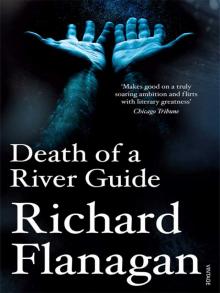 Death of a River Guide
Death of a River Guide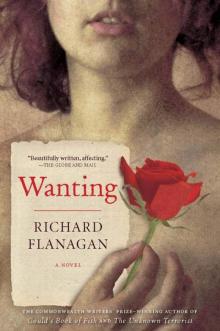 Wanting
Wanting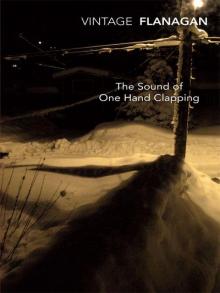 The Sound of One Hand Clapping
The Sound of One Hand Clapping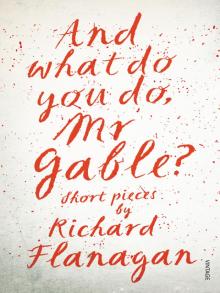 And What Do You Do Mr. Gable?
And What Do You Do Mr. Gable?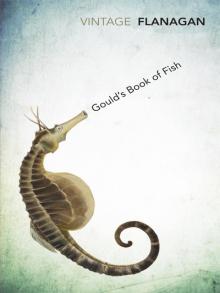 Gould's Book of Fish: A Novel in Twelve Fish
Gould's Book of Fish: A Novel in Twelve Fish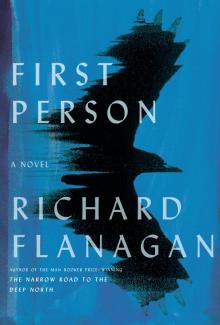 First Person
First Person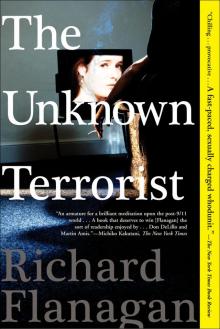 The Unknown Terrorist
The Unknown Terrorist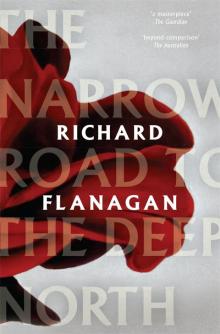 The Narrow Road to the Deep North
The Narrow Road to the Deep North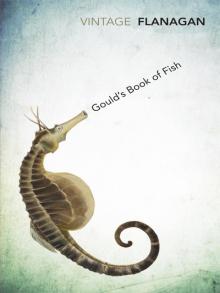 Gould's Book of Fish
Gould's Book of Fish